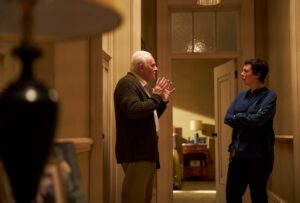The Father
Posted on March 9, 2021 at 9:13 am
B +| Lowest Recommended Age: | High School |
| MPAA Rating: | Rated PG-13 for some strong language, and thematic material |
| Profanity: | Some strong and crude language |
| Alcohol/ Drugs: | Alcohol and medication |
| Violence/ Scariness: | Tense confrontations |
| Diversity Issues: | Disability issues |
| Date Released to Theaters: | March 10, 2021 |

The beginning of any story — a movie, a play, a book — is like a puzzle. We are hardly aware of all the information we are processing, all the clues we are parsing to let us know who the characters are, where they are, when they are, and what is going on between them. And so, in “The Father,” we quickly come to some conclusions about Anthony (pronounced “An-tony”), played by Sir Anthony Hopkins. His daughter Anne (Olivia Colman) visits him in his apartment to chide him about firing his latest caregiver, as he has her several predecessors, and tells him that he must find a way to get along with his next caregiver because she is leaving London to live with her new boyfriend in Paris.
And then the movie proceeds to undermine almost everything we think we have seen and we gradually realize that we are seeing the world subjectively, through Anthony’s eyes and ears and he is the most unreliable of story-tellers because he is struggling with dementia. Just as last year’s “The Sound of Metal” told us the story of a musician’s hearing loss by letting us hear what he heard, and not hear what he didn’t, “The Father” tells us the story of Anthony’s fading memory by filtering what we are seeing through his ability to process it, so we are as unsure and unsettled as he is.
Everything we bring to the film about forming judgments and drawing conclusions is constantly undermined. Anne is sometimes played by Colman, sometimes by Olivia Williams. Sometimes she is married, sometimes divorced. Sometimes it’s his apartment, sometimes he has moved in with Anne. Sometimes he stands in the hallway, disoriented and lost. Sometimes Anne’s husband barks angrily at him.
A new caregiver (Imogen Poots) comes for an interview and we see Anthony putting everything he has into being charming and capable. He tells her he was once a tap dancer. (He was not.) He offers her a drink and has one himself. He tells her she looks like his other daughter, the one he thinks is still alive (she is not).
Hopkins is made for this role. Only a man of his decades of experience and dedication to meticulously observed and fearlessly vulnerable performances could show us Anthony’s valiant efforts to stay himself, to stay in charge. That makes the final moments, when we are finally returned to our own safe space as objective observers, even more shattering.
Parents should know that this movie concerns dementia and he strain it puts on family as well as the person struggling with memory loss. It includes some strong language, alcohol, and medication.
Family discussion: Does this film make you think differently about what it is like to have memory loss? How are the people in your life helping those who are facing this issue and those who are caring for them?
If you like this, try: “Away from Her,” “Still Alice,” “Still Mine,” “Dick Johnson is Dead,” “The Roads Not Taken,” and “Supernova”
